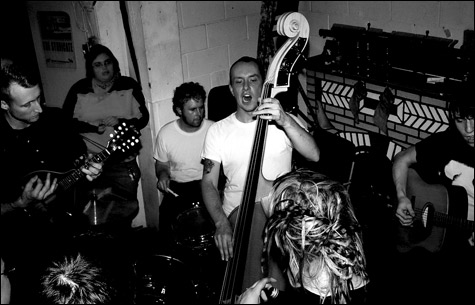
NO DROPKICK MURPHYS COVER: But the rootsy repertoire does have everything from female pirates to Carl Sandburg to a shape-note number. |
What comes to mind when you think of roots music? Neatly trimmed facial hair? A Stetson or two? Maybe matching outfits? Okay, now check out the men and woman of Bread and Roses. The release party back in July at the Middle East for their fine punk-spiked folk album Deep River Day (Fistolo Records) had the makings of a full-on punk-rock affair, with acoustic-guitarist Steve Fournier disappearing minutes before show time and fiddler Adam Haut suggesting later that he might take off his pants. More than these, it was the presence of Nate Puffer — cradling a mandolin in a wifebeater, his left arm sleeved in tattoos — that seemed to suggest a Dropkick Murphys cover was in the offing. But the Allston-based band — whose line-up also includes singer Morgan Coe (upright bass), Dan Pond (acoustic guitar), Dan Wilder (drums), and Whitney Weiss (banjo/acoustic guitar) — didn’t once break from their rootsy repertoire. That included a sea-shanty-styled number about a pair of female pirates, a musical take on Carl Sandburg’s poem “Grass,” and a partly reworked hymn unearthed from a shape-note songbook.
Now it’s two weeks later, and I’m sitting down with Coe, Haut, Fournier, and Puffer at the Common Ground in Allston, and wondering how they came to be hooked on these oldies. “We started out an electric band,” offers the sandy-haired, serious Coe, with only a dash of the Tom Waits-ian coot that comes out when he sings. “A lot of our stuff sounded like Gang of Four, maybe early Fugazi, nothing like we do now.” This was around 2002, when the line-up was just Coe on electric guitar and his friends Andrew Graham (bass) and Shin Matsuda (drums). The latter, a cook with an odd work schedule, had a habit of showing up late to shows. While waiting for his ass, the other two killed time with acoustic tracks like “Waltzing Matilda” and “Dump the Bosses Off Our Back.” Coe continues, “We were like, ‘Well, we’re not playing electric guitar without a drummer . . . ’ It was pretty much a desperate survival strategy.”
Matsuda and Graham eventually dropped out, and Coe, realizing the “weird country tunes” he and Graham had been doing as a “lark” worked well, began to rethink B&R’s arrangements. The drums were scrapped, a banjo player was brought on, and Coe, a long-time veteran of ska bands (the Allstonians), gave up his guitar for the upright bass. “After that, Nate, Adam, Steve — I guess you guys are the three that joined at the time that are still in. We have another drummer who joined and left, somebody left a little after that . . . after that, we sort of settled on more of a general sound.”
“As far as we’re concerned, the band started in 2004,” cracks the soft-spoken, mild-mannered Puffer, who, in a collared shirt, looks very different from the last time I saw him.